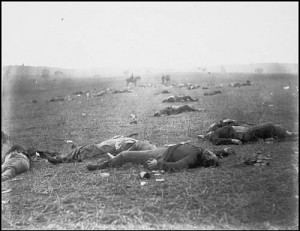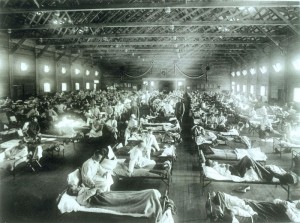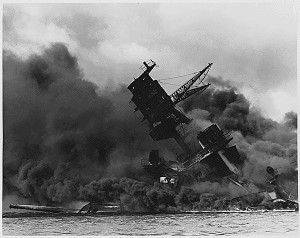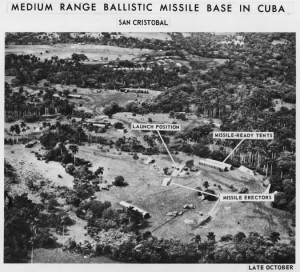As I had earlier mentioned, I would like to include excerpts from a letter written by General Sherman to General Halleck in Washington after the capture of Vicksburg in response to a request for advise on the administration of recaptured territories:
The question of reconstruction in Louisiana, Mississippi, and Arkansas, will soon come up for decision of the Government, and not only the length of the war, but our ultimate and complete success, will depend upon its decision.
…
I think [the President] is disposed to receive the advice of our generals who have been in these States, and know much more of their condition than gassy politicians in Congress. General Banks has written pretty fully, on the subject. I wrote to General Grant, immediately, after the fall of Vicksburg, for his views in regard to Mississippi, but he has not yet answered.
I wish you would consult with Grant, McPherson, and others of cool, good judgment, and write me your views fully, as I may wish to use them with the President.
This was an initial move towards forming a coherent reconstruction strategy, while the end of the war was still some time off. I found it interesting that the war’s eventual outcome already seemed to the high command a foregone conclusion. What I found of particular interest was the delineation of Southern men by type:
…
I would deem it very unwise at this time, or for years to come, to revive the State governments of Louisiana, etc., or to institute in this quarter any civil government in which the local people have much to say. They had a government so mild and paternal that they gradually forgot they had any at all, save what they themselves controlled; they asserted an absolute right to seize public moneys, forts, arms, and even to shut up the natural avenues of travel and commerce. They chose war—they ignored and denied all the obligations of the solemn contract of government and appealed to force.
We accepted the issue, and now they begin to realize that war is a two-edged sword, and it may be that many of the inhabitants cry for peace. I know them well, and the very impulses of their nature; and to deal with the inhabitants of that part of the South which borders on the great river, we must recognize the classes into which they have divided themselves:
First. The large planters, owning lands, slaves, and all kinds of personal property. These are, on the whole, the ruling class. They are educated, wealthy, and easily approached. In some districts they are bitter as gall, and have given up slaves, plantations, and all, serving in the armies of the Confederacy; whereas, in others, they are conservative. None dare admit a friendship for us, though they say freely that they were at the outset opposed to war and disunion. I know we can manage this class, but only by action. … A civil government of the representative type would suit this class far less than a pure military role, readily adapting itself to actual occurrences, and able to enforce its laws and orders promptly and emphatically.
The scions of the Antebellum South did, indeed, continue in that capacity after the war.
Second. The smaller farmers, mechanics, merchants, and laborers. This class will probably number three-quarters of the whole; have, in fact, no real interest in the establishment of a Southern Confederacy, and have been led or driven into war on the false theory that they were to be benefited somehow—they knew not how. They are essentially tired of the war, and would slink back home if they could. These are the real tiers etat of the South, and are hardly worthy a thought; for they swerve to and fro according to events which they do not comprehend or attempt to shape. When the time for reconstruction comes, they will want the old political system of caucuses, Legislatures, etc., to amuse them and make them believe they are real sovereigns; but in all things they will follow blindly the lead of the planters. The Southern politicians, who understand this class, use them as the French do their masses—seemingly consult their prejudices, while they make their orders and enforce them. We should do the same.
I find it interesting that Sherman identifies this easily influenced sort of people. The same group of people can still be counted on to vote against their own interest with the weakest argument. These were the Rush Limbaugh listeners of the 19th Century.
Third. The Union men of the South. I must confess I have little respect for this class. They allowed a clamorous set of demagogues to muzzle and drive them as a pack of curs. Afraid of shadows, they submit tamely to squads of dragoons, and permit them, without a murmur, to burn their cotton, take their horses, corn, and every thing; and, when we reach them, they are full of complaints if our men take a few fence-rails for fire, or corn to feed our horses. They give us no assistance or information, and are loudest in their complaints at the smallest excesses of our soldiers. Their sons, horses, arms, and every thing useful, are in the army against us, and they stay at home, claiming all the exemptions of peaceful citizens. I account them as nothing in this great game of war.
Fourth. The young bloods of the South: sons of planters, lawyers about towns, good billiard-players and sportsmen, men who never did work and never will. War suits them, and the rascals are brave, fine riders, bold to rashness, and dangerous subjects in every sense. … [T]hey are the most dangerous set of men that this war has turned loose upon the world. They are splendid riders, first-rate shots, and utterly reckless. Stewart, John Morgan, Forrest, and Jackson, are the types and leaders of this class. These men must all be killed or employed by us before we can hope for peace. They have no property or future, and therefore cannot be influenced by any thing, except personal considerations. …
Here, Sherman was eerily prescient. Men of this type did continue in extra-legal paramilitary pursuits in the form of terrorist organizations such as the Ku Klux Klan (Forrest) or criminal organizations such as the James Gang. Many infamous outlaws of the Old West were born of that group.
Now that I have sketched the people who inhabit the district of country under consideration, I will proceed to discuss the future.
A civil government now, for any part of it, would be simply ridiculous. The people would not regard it, and even the military commanders of the antagonistic parties would treat it lightly. Governors would be simply petitioners for military assistance, to protect supposed friendly interests, and military commanders would refuse to disperse and weaken their armies for military reasons. Jealousies would arise between the two conflicting powers, and, instead of contributing to the end of the war, would actually defer it. Therefore, I contend that the interests of the United States, and of the real parties concerned, demand the continuance of the simple military role, till after all the organized armies of the South are dispersed, conquered, and subjugated.
…
God knows that I deplore this fratricidal war as much as any man living, but it is upon us, a physical fact; and there is only one honorable issue from it. We must fight it out, army against army, and man against man; and I know, and you know, and civilians begin to realize the fact, that reconciliation and reconstruction will be easier through and by means of strong, well-equipped, and organized armies than through any species of conventions that can be framed. The issues are made, and all discussion is out of place and ridiculous. The section of thirty-pounder Parrott rifles now drilling before my tent is a more convincing argument than the largest Democratic meeting the State of New York can possibly assemble at Albany; and a simple order of the War Department to draft enough men to fill our skeleton regiments would be more convincing as to our national perpetuity than an humble pardon to Jeff. Davis and all his misled host.
The only government needed or deserved by the States of Louisiana, Arkansas, and Mississippi, now exists in Grant’s army. … The people of this country have forfeited all right to a voice in the councils of the nation. They know it and feel it, and in after-years they will be the better citizens from the dear bought experience of the present crisis. … As a nation, we shall be the better for it.
…
I therefore hope the Government of the United States will continue, as heretofore, to collect, in well-organized armies, the physical strength of the nation; applying it, as heretofore, in asserting the national authority; and in persevering, without relaxation, to the end. This, whether near or far off, is not for us to say; but, fortunately, we have no choice. We must succeed—no other choice is left us except degradation. The South must be ruled by us, or she will rule us. We must conquer them, or ourselves be conquered. There is no middle course. They ask, and will have, nothing else, and talk of compromise is bosh; for we know they would even scorn the offer.
I wish the war could have been deferred for twenty years, till the superabundant population of the North could flow in and replace the losses sustained by war; but this could not be, and we are forced to take things as they are.
All therefore I can now venture to advise is to raise the draft to its maximum, fill the present regiments to as large a standard as possible, and push the war, pure and simple.
…
Excuse so long a letter. With great respect, etc.,
W. T. SHERMAN, Major-General.
This is first place where we see the strategy that will forever come to be identified with Sherman: pursuing a peace by ending the enemy’s ability to make war.
Sherman went on to intimate that President Lincoln had wished to have the letter published. Not wishing to be embroiled in controversy, however, General Sherman declined.
















Recent Comments